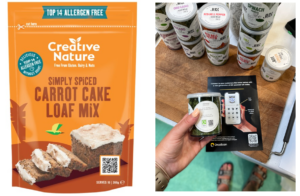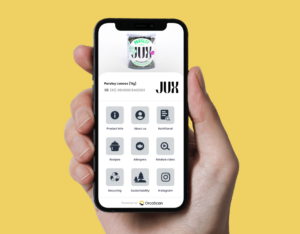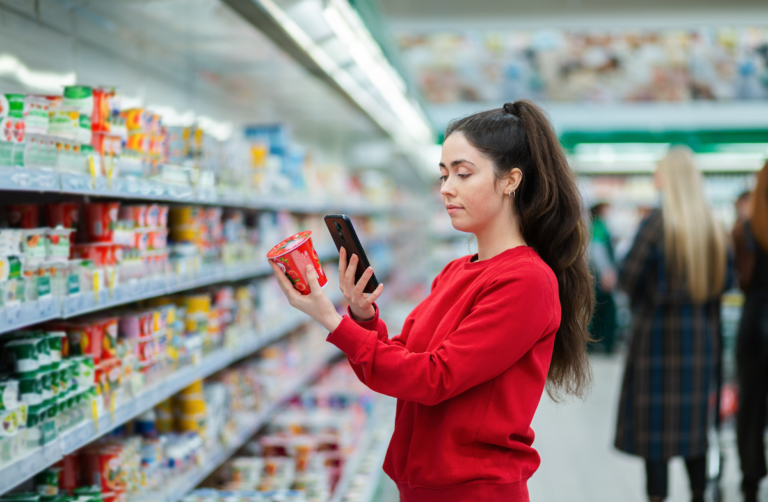96 per cent of leading UK retail executives expect another retail technology transformation by 2030 – with 43 per cent saying their industry is changing more rapidly today than they have ever witnessed in their careers.
A crisis of consumer trust in brands is a major catalyst according to consumer expert and retail strategist Kate Hardcastle MBE.
It comes as 89 per cent of retail executives agree consumers are less loyal to brands than they were 10 years ago. This is reinforced by the fact that under half (48 per cent) of the UK population express some level of trust in businesses.
The report was commissioned by GS1 UK to understand the trends, challenges and priorities facing the retail industry.
It found that 92 per cent within the industry say there will be no retail transformation without a unified approach to data and transparency.
Technology which can communicate data to consumers emerged as essential to stemming the decline in consumer trust; with QR codes powered by GS1 being recognised as a key enabler.
These smarter QR codes are dual-purpose – giving every product the ability to provide consumers instant access to comprehensive online information and also going beep at the till.
The potential of this technology is so great that 41 per cent of leading UK retail executives say smart QR codes will replace the linear barcode within five years, creating huge changes for businesses and the way that consumers shop – not just in the UK but worldwide.
91 per cent within the industry believe that most retail businesses are still using technology dating from the 1990’s – so the race to transition becomes even more challenging.
This challenge must be addressed given that 84 per cent of executives said that those who do not adopt smart QR codes within the next three years will lose out on billions of pounds in revenue.
QR codes powered by GS1 are now being tested in 48 countries, representing 88% of the world’s GDP. Globally, GS1 aims to ensure a comprehensive rollout by 2027 and many leading household brands including PepsiCo, Walmart, P&G, Loreal and Amazon are already onboard.
Morrisons is one of the retailers exploring the potential of this new technology with solutions architect, Sagar Mehendale, saying that the smart QR code, supported by trusted data, is replacing the barcode to become the “‘de facto standard for identifying your product at SKU level and also augmenting information about the product.”
Increasing transparency between brands and consumers was found to be the top method of rebuilding consumer trust – with 77 per cent of consumers seeking in-depth information on the products they purchase.
QR codes powered by GS1 will allow consumers to instantly access hyper-relevant insights. This could include information on a products provenance, its carbon footprint, the risk of contamination with potential food allergens – and much more.
For example, access to detailed and trusted data from across the supply chain would allow climate conscious consumers to learn where a products components are made or sourced and the volume of emissions generated in their manufacture and transport. Similarly, ethical consumers can inform themselves about the labour standards behind every product.
Over one-third (34 per cent) of executives say that the ability of customers to access product information will be one of the biggest areas of change in retail between now and 2030.
The report found that when customers lose trust in product data because it is inaccurate or insufficient, they often lose trust in the brands that provide it.
For example, previous research from GS1 UK found that mislabelled or unclear food packaging has meant that 56 per cent of people with food allergies have had an allergic reaction.
Whilst 57 per cent believe companies engage in ‘greenwashing’ – highlighting the collapse of trust in product  information and the reputational risk this can cause. With 88 per cent agreeing that smart QR codes will be essential in the future for meeting regulatory requirements, highlighting their importance for supporting sustainability goals.
information and the reputational risk this can cause. With 88 per cent agreeing that smart QR codes will be essential in the future for meeting regulatory requirements, highlighting their importance for supporting sustainability goals.
The new level of transparency brought about by a revolution in access to product information will help consumers differentiate the brands which are open and honest, from those that are not.
This comes as nearly half (46 per cent) of the companies surveyed in the report said they have already begun building QR capabilities, and 52 per cent will start doing so within the next two years.
As many as four in 10 (40 per cent) respondents said that without this additional investment, retail businesses will be unable to meet their sustainability targets – with 53 per cent agreeing that quality data will be essential to ensuring these are met.
According to the report, improved QR capabilities will help businesses to build an end-to-end view of the product journey built on trusted data that flows from suppliers, into stores and ultimately into the hands of consumers.
Kate Hardcastle, retail strategist, explained: Consumers’ increasing demand for more information and a better experience will create a survival-of-the-fittest dynamic in retail, even among the sector’s biggest brands. Those which provide greater transparency by giving consumers honest and easily accessed information will have an undeniable competitive advantage.
Anne Godfrey, CEO of GS1 UK, who led the report with FT Longitude said “The invention of the barcode is one of the great, untold stories in the history of our modern world – it is more frequently used than Google. The next generation of barcodes codes – QR codes powered by GS1 – will underpin the next retail revolution to give greater power to the consumer. They will connect physical products to the digital world to give businesses the power to provide the detailed product information consumers are increasingly demanding.



